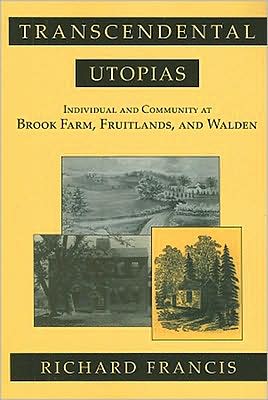

 |

|

The average rating for Transcendental Utopias: Individual and Community at Brook Farm, Fruitlands, and Walden based on 2 reviews is 3.5 stars.
Review # 1 was written on 2019-01-26 00:00:00 Mark Crawford Mark CrawfordTranscendental Utopias is a thoroughly academic work whose intended audience is other scholars in the field. It is a rather dense work for the general reader, and I would not recommend it for someone with no familiarity of the American Transcendental movement. Richard Francis assumes the reader of this book has the necessary background to immediately engage with the material. I found myself taking numerous breaks to gain the required context for much of the book to make sense - particularly the large amount of literary criticism inherent in any serious work about Transcendentalism. That said, I did learn a lot about the key personalities behind these three famous attempts at reconciling what Transcendentalists saw as natural law with observed history. The book is the product of a much later blending of the author's previous article length works. The book's structure reflects that with Brook Farm comprising about half of the book. Fruitlands receives a smaller amount of attention over two chapters, while Walden gets scant coverage in a small chapter that also includes substantial asides on Whitman and Theodore Parker used as evidence to round out the branch of thought centered on the individual. Francis focuses on the larger theme of how Transcendentalists attempted to reconcile natural law and history to bridge these narrative disparities, effectively using a thematic approach to unite these various threads of philosophy and their points of intersection. Brook Farm, Fruitlands, and Walden are worthy of analysis because they were historical (meaning they occurred in the temporal plain of man's existence) attempts at bringing about social utopia through application of philosophical principles. Christian principles are evident in much of the American thought, unsurprising as American Transcendentalism was heavily influenced by the New England Unitarian church. The more interesting part of the Brook Farm and Fruitlands experiments is the intersection with labor organization. This is particularly interesting looking back from the position of a post-industrial society morphing into the Information Age in a globally linked economy, because these experiments took place in a time of change where local economies driven by shopkeepers, farmers, and craftsmen increasingly gave way to large capital and industrialization. The sense that change and disorientation meant something was being lost to humanity was evident then as much as it is today. The answer for Transcendentalists was found in labor organization, although the focus on change springing from the individual, the nuclear family, or the community differed from philosopher to philosopher. As we know, these experimental communities failed at creating utopia. Brook Farm dissolved after adopting the Fourierist phalanx, but Francis argues that internal inconsistencies combined with the catastrophic fire that burned its main building to the ground were the real causes of its demise. The Fruitlands dissolved after only six months from a philosophical disagreement between Bronson Alcott and Charles Lane, the two founders, about the position of the nuclear family in bringing about utopia, the threat of Abigail Alcott leaving owing to the long absences of Bronson and Lane and the resulting work load, and what seems to be a real failure to plan at the outset. Francis explains the philosophical underpinnings of these experiments through literary criticism and psychoanalysis of the key personalities involved in their creation, short lives, and ultimate demise. The short chapter on Walden serves as an appropriate close as it exposes the effects of time and change in the historical realm on the Transcendentalists. Alcott transitioned from utopian farm on a grand scale to small garden and focus on the nuclear family as the agent of change. Thoreau moved from natural patterns to variance within these patterns, while Theodore Parker focused increasingly on the individual as change agent but only through acting in the temporal world. Ultimately, Transcendentalism was an attempt to understand how to link higher law, or universal principles (truth) with that of observed experience in the historical realm, and that is still something we wrestle with today. We are witnessing the death of churches but the rise of spiritualism. Endurance and adventure sports are gaining popularity. Escape from observed experience is carried in our hands with the touch of an app icon. The early 19th century presented a feeling of newness as America was a young country. The possibility of change is what gave birth to action. As we sit on the precipice of human expansion into space, are we not also entering a new time of possibility for social change? Or are we doomed to carry the sins of the temporal realm with us even as we glimpse opportunities to build heaven? |
Review # 2 was written on 2019-02-12 00:00:00 William Crossfield William CrossfieldWhat is the best way to elevate one's soul using transcendentalist philosophy....in a commune with like-minded folks, or alone in the woods near a pond with only the natural world as company? Perhaps a bit of both or even a third way would be best. Whatever, this author explores the concepts and the thinking behind each experiment. The utopian communes at Brook Farm and Fruitlands did not survive. On the other hand the Walden "community of one" did survive, if only in the pages of a literary masterpiece. |
CAN'T FIND WHAT YOU'RE LOOKING FOR? CLICK HERE!!!